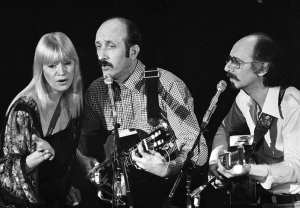Peter Yarrow of folk-music trio Peter, Paul and Mary dies at 86
 Send a link to a friend
Send a link to a friend
 [January 08, 2025]
By JOHN ROGERS [January 08, 2025]
By JOHN ROGERS
LOS ANGELES (AP) — Peter Yarrow, the singer-songwriter best known as
one-third of Peter, Paul and Mary, the folk-music trio whose impassioned
harmonies transfixed millions as they lifted their voices in favor of
civil rights and against war, has died. He was 86.
Yarrow, who also co-wrote the group's most enduring song, “Puff the
Magic Dragon,” died Tuesday in New York, publicist Ken Sunshine said.
Yarrow had bladder cancer for the past four years.
“Our fearless dragon is tired and has entered the last chapter of his
magnificent life. The world knows Peter Yarrow the iconic folk activist,
but the human being behind the legend is every bit as generous,
creative, passionate, playful, and wise as his lyrics suggest,” his
daughter Bethany said in a statement.
During an incredible run of success spanning the 1960s, Yarrow, Noel
Paul Stookey and Mary Travers released six Billboard Top 10 singles, two
No. 1 albums and won five Grammys.
They also brought early exposure to Bob Dylan by turning two of his
songs, “Don't Think Twice, It's All Right” and “Blowin' in the Wind,”
into Billboard Top 10 hits as they helped lead an American renaissance
in folk music. They performed “Blowin’ in the Wind” at the 1963 March on
Washington at which the Rev. Martin Luther King Jr. delivered his famous
“I Have a Dream” speech.

Yarrow played roles onstage and offstage at the iconic Newport Folk
Festival in 1965 when Dylan went electric. Yarrow was on the festival
board and emceed the show, begged Dylan to go back on to play another
song after his blistering set, a scene captured in the 2024 biopic “A
Complete Unknown.” Dylan took Yarrow's acoustic guitar and played “It’s
All Over Now, Baby Blue.”
After an eight-year hiatus to pursue solo careers, the trio reunited in
1978 for a “Survival Sunday,” an anti-nuclear-power concert that Yarrow
had organized in Los Angeles. They would remain together until Travers'
death in 2009. Yarrow and Stookey continued to perform both separately
and together.
After recording their last No. 1 hit, a 1969 cover of John Denver’s
“Leaving on a Jet Plane,” the trio split up the following year to pursue
solo careers.
That same year Yarrow had pleaded guilty to taking indecent liberties
with a 14-year-old girl who had come to his hotel room with her older
sister to ask for autographs. The pair found him naked when he answered
the door and let them in. Yarrow, who resumed his career after serving
three months in jail, was pardoned by President Jimmy Carter in 1981.
Over the decades, he apologized repeatedly.
“I fully support the current movements demanding equal rights for all
and refusing to allow continued abuse and injury — most particularly of
a sexual nature, of which I am, with great sorrow, guilty,” he told The
New York Times in 2019 after being disinvited from a festival over the
sentence.
Born May 31, 1938, in New York, Yarrow was raised in an upper middle
class family he said placed high value on art and scholarship. He took
violin lessons as a child, later switching to guitar as he came to
embrace the work of such folk-music icons as Woody Guthrie and Pete
Seeger.

Upon graduating from Cornell University in 1959, he returned to New
York, where he worked as a struggling Greenwich Village musician until
connecting with Stookey and Travers. Although his degree was in
psychology, he had found his true calling in folk music at Cornell when
he worked as a teaching assistant for a class in American folklore his
senior year.
“I did it for the money because I wanted to wash dishes less and play
guitar more,” he told the late record company executive Joe Smith. But
as he led the class in song, he began to discover the emotional impact
music could have on an audience.
“I saw these young people at Cornell who were basically very
conservative in their backgrounds opening their hearts up and singing
with an emotionality and a concern through this vehicle called folk
music,” he said. “It gave me a clue that the world was on its way to a
certain kind of movement, and that folk music might play a part in it
and that I might play a part in folk music.”
[to top of second column]
|

Folk trio Peter, Paul and Mary, from left, Mary Travers, Paul
Stookey and Peter Yarrow, perform at a Los Angeles benefit to aid to
Cambodian refugees on Jan. 30, 1980. (AP Photo/George Brich, File)
 Soon after returning to New York, he
met impresario Albert Grossman, who would go on to manage Dylan,
Janis Joplin and others and who at the time was looking to put
together a group that would rival the Kingston Trio, which in 1958
had a hit version of the traditional folk ballad “Tom Dooley.”
But Grossman wanted a trio with a female singer and a member who
could be funny enough to keep an audience engaged with comic patter.
For the latter, Yarrow suggested a guitar-strumming Greenwich
Village comic he’d seen named Noel Stookey.
Stookey, who would use his middle name as a member of the group,
happened to be a friend of Travers, who as a teenager had performed
and recorded with Pete Seeger and others. Gripped by stage fright,
she was reluctant to join the pair at first, changing her mind after
she heard how well her contralto voice melded with Yarrow’s tenor
and Stookey’s baritone.
“We called Noel up. He was there,” Yarrow said, recalling the first
time the three performed together. “We mentioned a bunch of folk
songs, which he didn’t know because he didn’t have a real folk-music
background, and wound up singing ‘Mary Had a Little Lamb.’ And it
was immediately great, was just as clear as a bell, and we started
working.”
After months of rehearsal the three became an overnight sensation
when their first album, 1962’s eponymous “Peter, Paul and Mary,”
reached No. 1 on the Billboard chart. Their second, “In the Wind,”
reached No. 4 and their third, “Moving,” put them back at No. 1.
From their earliest albums, the trio sang out against war and
injustice in songs like Seeger’s “If I Had a Hammer” and “Where Have
all the Flowers Gone,” Dylan’s “Blowin’ in the Wind” and “When the
Ship Comes In” and Yarrow’s own “Day is Done.”

They could also show a soft and poignant side, particularly on “Puff
the Magic Dragon,” which Yarrow had written during his Cornell years
with college friend Leonard Lipton.
It tells the tale of Jackie Paper, a young boy who embarks on
countless adventures with his make-believe dragon friend until he
outgrows such childhood fantasies and leaves a sobbing, heartbroken
Puff behind. As Yarrow explains: “A dragon lives forever, but not so
little boys.”
Some insisted they heard drug references in the song, a contention
at the heart of a famous scene in the film “Meet the Parents,” when
Ben Stiller angers his girlfriend’s tightly wound father (Robert De
Niro) by saying “puff” refers to marijuana smoke. Yarrow maintained
it reflected the loss of childhood innocence and nothing more.
Over the years, Yarrow continued to write and co-write songs,
including the 1976 hit “Torn Between Two Lovers” for Mary MacGregor.
He received an Emmy nomination in 1979 for the animated film “Puff
the Magic Dragon.”
Later songs include the civil rights anthem “No Easy Walk to
Freedom,” co-written with Margery Tabankin, and “Light One Candle,”
calling for peace in Lebanon.
Yarrow, who with Travers and Stookey had supported Democratic Sen.
Eugene McCarthy’s 1968 presidential bid, met the Minnesota senator’s
niece, Mary Beth McCarthy, at a campaign event. The couple married
the following year. They had two children before divorcing. They
remarried in 2022.
In addition to his wife and daughter, he is survived by a son,
Christopher, and a granddaughter, Valentina.
___
AP Entertainment Writer Mark Kennedy contributed reporting from New
York. Rogers, the principal writer of this obituary, retired from
The Associated Press in 2021.
All contents © copyright 2024 Associated Press. All rights reserved |